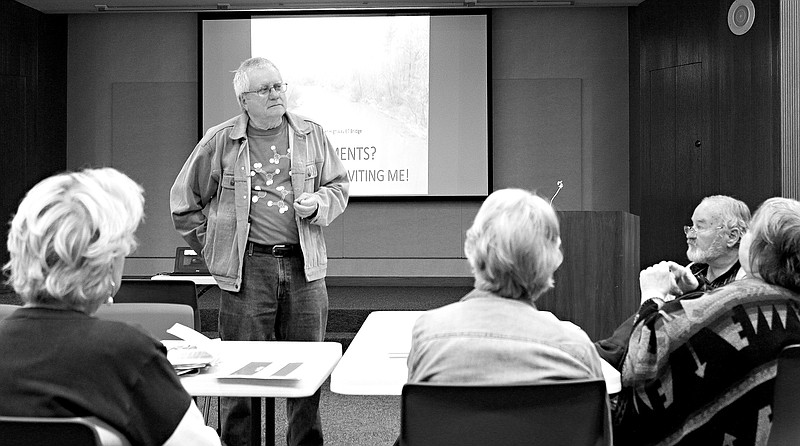The water quality and sedimentation specialist for the Sulphur River Basin Authority spoke about the amount of sedimentation in Wright Patman Lake during Tuesday's regular meeting of Friends United for a Safe Environment.
Dr. Mike Buttrem, who has worked with SRBA and the Clean Rivers Program for many years, explained how sedimentation ends up in the lake, which serves as the area's primary water source. He pointed to a map that showed the North Sulphur River Basin where Sulphur Creek used to flow.
"In 1928, the Sulphur Improvement District was created," Buttrem said. It was also known as Fannin, Lamar and Delta County Levee District 3.
"When they created that, they channelized 18.6 miles of the creek, which flows right into Wright Patman Lake," he said, adding that the channel was cut to be 16 feet wide and 10 feet deep. "When they did it, the engineers told them it was going to be a catastrophe. Because when you straighten out streams, you create problems. Now, of course, you do."
He showed a slide of that portion of the North Sulphur River, which now measures approximately 300 feet wide and 60 to 80 feet deep. While it was straightened to keep the creek from flooding the farmland along the river, Buttrem said the action caused a steep loss for those farmers.
"Three thousand acres of land have been lost, which is 180,000 acre-feet of soil," he said. That material flowed down into Lake Wright Patman, where studies have shown it is holding less water than in the 1960s, when it was created by putting a dam on the Sulphur River.
Buttrem also showed a slide of Texarkana Water Utilities' intake structure on the northeast portion of the lake, which was surrounded by sediment. He said it's basically a concrete trough with a metal grate over it where water flows into a tube where it's pumped to the water treatment station. He pointed out that that area fills with sediment and that International Paper paid to have it cleared out a few years ago so they could get water for operations.
"International Paper wanted them to release water so they could dump their ponds in the river over in Arkansas, and they had to have a certain amount of water coming down through there for regulations. They came along and they paid to have that sediment dredged out so they could let some more water out. It cost half a million dollars to dredge it," he said, pointing at the slide. "If you didn't believe in sedimentation before, now you can actually see it, see the impact, and it's costing money to go in and remove the sediment. Not only that, but you're losing a lot of your property."
Another slide during the presentation was of the Texas Water Development Board's 2017 State Water Plan, which shows a negative 39 percent change in the available water in Sulphur River Basin.
"That's a huge number. That means that our basin has a lot of problems," he said. "Almost all that number-I went back and looked at the data part-almost all of it comes from Wright Patman Lake. If you go up to Jim Chapman Lake and the upper part of the basin, it's almost zero up there. No percentage at all. But Wright Patman is where it is. We have a huge sedimentation problem. Sure enough, looking around the water intake structure, we definitely have one. You can see it."
The next FUSE meeting is scheduled for Jan. 9, 2018.

